| |
AUGUST 6, 2017, IS THE 71 ANNIVESARY OF THE SECOND ATOMIC
BOMB EXPLOSION IN THE HISTORY OF THE WORLD!! |
|
Adolf Hitler was a grandson of Queen Victoria and a cousin of Winston Churchill. Together, they planned on using the limitless industrial and financial resources of the United States of Israel to produce a super weapon called the atomic bomb. They hoped to end what the Vatican calls the "Great Schism," or the Latin and Orthodox division of the Roman Empire.
After the Battle of Stalingrad,
British secret agent Benito Mussolini warned fellow spy Adolf Hitler that
the war was lost. What kept Hitler in the fight was the prospect of a super-weapon
that would snatch victory from the jaws of defeat at the 11th hour.
After
Charles "Kissin' Cousins" Darwin's On the Origin of Species by Natural Selection, the
most exciting book for the British Empire was published in 1875. It was entitled
Physics of the Ether by Samuel Tolver Preston. Unlike fake "scientist"
Albert Einstein, Preston believed in
the existence of the ether.
Most of the "British"
scientific discoveries actually originated in India as that country was raped
economically and intellectually. An ancient Sanskrit text called
the Mahābhārata mentions nuclear war, and when the 2nd atomic bomb exploded
at Los Alamos, New Mexico, Robert Oppenheimer quoted the Bhagavad Gita:
Now
I am become Death, the destroyer of worlds.
(Bhagavad Gita, chapter 11, verse 32).
The knowledge of the wicked,
highly advanced antediluvian civilization was preserved in the Great Pyramid
at Giza, and most of the so-called "legends" of the pre-Flood world
originated in that country.
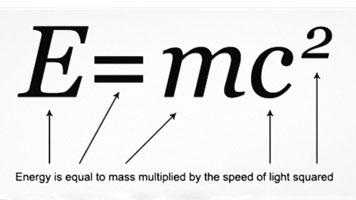
This formula had the British bulldog drooling!!
|
|
Physics
of the Ether by Samuel Tolver Preston was published in
London in 1875.
It
showed the extraordinary relationship between matter, time, and
energy.
It
was the most explosive discovery since gunpowder cannon.
|
|
|
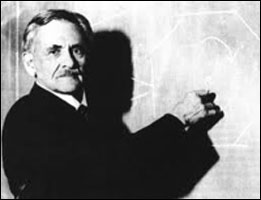
Samuel Tolver Preston
(1844–1917).
|
To the military establishment
in the British Empire it held out the possibility of a super weapon
to destroy Britannia's 3 main rivals: France, Russia and the United States....It
also held out the possibility of ending the so-called Great
Schism....Here is a short excerpt from that book:
To give
an idea, first, of the enormous intensity of the store of energy attainable
by means of that extensive state of subdivision of matter which renders a
high normal speed practicable, it may be computed that a quantity of matter
representing a total mass of only one grain, and possessing the normal velocity
of the ether particles (that of a wave of light),
encloses a store of energy represented by upwards of one thousand millions
of foot tons, or the mass of one single grain contains an energy not less
than that possessed by a mass of forty thousand tons, moving at the speed
of a cannon ball (1200 feet per second); or otherwise, a quantity of matter
representing a mass of one grain endued with the velocity of the ether
particles, encloses an amount of energy which, if entirely utilized, would
be competent to project a weight of one hundred thousand tons to a height
of nearly two miles (1.9 miles).
This remarkable result may serve to illustrate well
the intense mechanical effect derivable from small quantities of matter possessing
a high normal velocity, the extremely high value of the effect depending on
the fact that energy rises in the rapid ratio of the square of the speed.
(Samuel Tolver Preston, Physics of the Ether, p. 115).
That explosive book was
published just the year after Winston
Churchill was born. Churchill was the son of Jennie Jerome from Brooklyn
and "Edward the Caresser." 1881 was another milestone in the development
of the atomic bomb when Samuel
Insull arrived in the British Empire State.
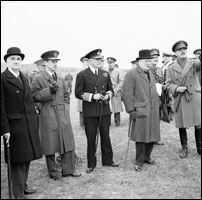
Churchill and Lindemann watching an anti-aircraft
demonstration, June 1941.
|
|
Frederick
Lindemann (Lord Cherwell) was a professor at Oxford
University and chief scientific adviser to Winston Churchill
during WWII.
German
born Lindemann, "Baron Berlin," was an ardent Nazi and
extreme racist!!
Churchill
and Lindemann became close friends in the early 1930's, and he
was a frequent guest at Churchill's Chartwell mansion. |
|
|
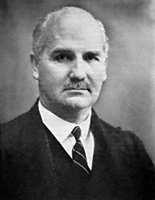
Frederick Lindemann
(1886–1957).
|
Lindemann typified the
arrogant, militaristic Prussian. He shared many things in common with Churchill,
including the fact that they both had American mothers, and both had fake
"Jews" in their ancestry:
By 1932,
Lindemann had become one of the most frequent guests at Chartwell. Even his
arrival was an event. Emerging from his limousine, attended by his liveried
chauffeur and valet, he looked less like a scientist than an investment banker,
complete with a velvet-collared Melton overcoat and bowler hat, even during
the dog days of summer. Churchill's chef had to make special provision for
the Prof, whose vegetarian diet featured an exceptionally narrow range of
meals, including dishes made from egg whites (not the yolks), skinned tomatoes,
waxy potatoes and only the highest-quality fresh mayonnaise. No one seemed
to mind the inconvenience of catering to his tastes. Clementine was extremely
fond of him, and the Churchill children treated him like a favourite uncle–he
always remembered their birthdays and never left them before pressing a banknote
into their grateful hands. (Farmelo, Churchill's Bomb, p. 44).
In 1933, Churchill ordered
cousin Alolf Hitler to start "persecuting" the fake "Jewish"
physicists in order to get them to leave Germany and work under him at Oxford
University:
The threat
to German Jews was soon implemented. In early 1933, very soon after Hitler
had gained power, new laws were rushed out in Germany. Jews and part Jews,
who were classified as "Non-Aryans," were forbidden to hold most
offices, and as many doctors and professors, particularly in the fields of
physics and maths, were Jewish, there was a sudden and dramatic upheaval in
the scientific world. (Fort, Prof: The Life of Frederick Lindemann,
p. 117).
When Churchill was appointed
Prime Minister in 1940, he appointed Lindemann "the Prof" as the
British government's leading scientific adviser, with David Bensusan-Butt
as his private secretary. Lindemann attended meetings of the War Cabinet,
accompanied the prime minister on conferences abroad, and sent him an average
of one missive a day. He saw Churchill almost daily for the duration of the
war and wielded more influence than any other civilian adviser. He would hold
this office again for the first two years of Churchill's peacetime administration
King Adolf
annexed Czechoslovakia for uranium!!
Under orders from Churchill
and Lindemann, Hitler entered Prague on March 15, 1939, and from Prague Castle
proclaimed Bohemia and Moravia a German protectorate.
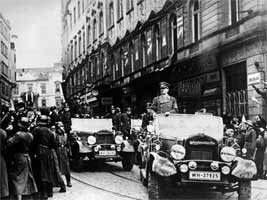
King Adolf I entered Prague on
March 15, 1939.
|
|
In
1939, Czechoslovakia was an advanced industrial country.
More
importantly for Churchill and Hitler, Czechoslovakia was the only
source of uranium in Europe.
A
uranium mine was located in the town of St. Joachimsthal in Bohemia.
|
|
|
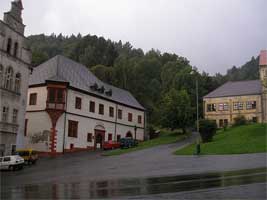
St. Joachimsthal museum
in Bohemia.
|
At the beginning of the
20th century, Pierre and Marie Curie isolated uranium from tons of pitchblende
ore mined in Joachimsthal. Until the First World War, Czechoslovakia was the
only known source of uranium in the world.
Czechoslovakia had the
industrial infrastructure for the production of the atomic bomb:
As early
as 1926, the German army had recognised the potential value of Czechoslovak
industry and resources. A secret report in the German military archives gives
a detailed analysis of mining and industry and where the different types of
factory were situated. It is comprehensive and even includes the number of
workers employed and production totals. Later in 1936-38, as the Munich crisis
deepened, the German military and its leaders reading the report will have
realised that little had altered since 1926, only the production totals and
numbers of workers had altered. But in some ways the seizure of Bohemia and
Moravia though adding considerably to the industrial capacity would only reach
its full potential if the coalfields and iron and steel works of South Poland
were also seized. This helps to explain Hitler's long term strategy, which
was not only to gain additional living space but also the industrial resources
to take on the USSR as the ultimate goal. (Crowhurst, Hitler & Czechoslovakia
in WW II, pp.194-195).
One of the largest manufacturing
conglomerates in Europe was Škoda Works, and ČKD (Českomoravská Kolben-Daněk).
After Bohemia and Moravia became part of the Reich, work commenced immediately
on building the infrastructure for the production of nuclear weapons.
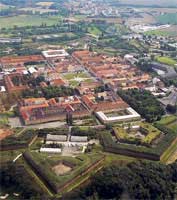
Terezin as it looks today.
|
|
Accommodation
for hundreds of thousands of workers was constructed at Terezin
near Prague.
A
vast underground factory, code named "Richard,"
20 miles long and 200ft underground was cut out of a nearby
mountain.
Financing
came from the BIS (Bank for International Settlements) in Basel,
Switzerland. |
|
|
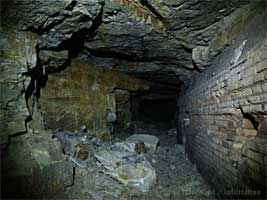
The vast underground atomic bomb factory was designed by British engineers and was 20 miles long.
|
Financing for this gargantuan
factory came from U.S. gold confiscated by Roosevelt and shipped overseas
to the BIS (Bank for International Settlements) in Basel, Switzerland.
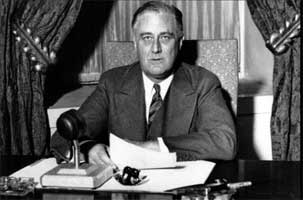
On April 5, 1933, Roosevelt ordered all
U.S. citizens to turn
in their gold.
|
|
Executive
Order 6103, signed by President Roosevelt, ordered the confiscation
of all private gold at $20.67 an ounce.
The
next year gold was revalued at $35.00 an ounce. It was called
the Great Gold Robbery of 1933.
"Fake Jew" Henry Morgenthau oversaw the greatest confiscation of private wealth in the entire history of the world.
|
|
|
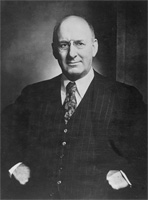
Henry J. Morgenthau (1891–1967).
Treasury Sec. from '34 to '45.
|
It
was the greatest gold theft since Cortés and Pizarro....Thousands of workers
died from radioactive poisoning and were buried nearby. As a cover-up, it
was later claimed that they were "Jewish" concentration camp victims!!
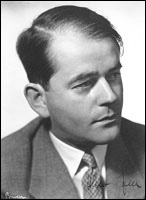
Albert Speer
(1905–1981).
|
|
From
1942 onward, Albert Speer was Hitler's Minister of Armaments and
War Production.
His
job was to oversee the physical construction of the bomb.
Werner
Heisenberg was just one of the dozens of top scientists who worked
feverishly on solving the theoretical problems of a nuclear explosion.
|
|
|

Werner Heisenberg
(1901–1976).
|
By March 1940, Churchill
and Lindemann knew exactly how far nuclear research had progressed in Germany
when a memorandum was published by 2 fake "Jewish" emigres named
Otto Frisch and Rudolf Peierls.
The
1940 Frisch-Peierls Memorandum on nuclear weapons!!
Austrian Otto Frisch,
and his colleague, German Rudolf Peierls, were both professors at Birmingham
University in 1940. In March of that year they published a paper on the
possibility of an atomic bomb and its destructive power. It is called the
Frisch-Peierls Memorandum.
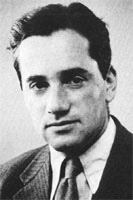
Otto Frisch
(1904–1979).
|
|
In
terms easy to be understood, Otto Frisch and Rudolf Peierls
described how to construct an atomic bomb with a small amount
of uranium-235.
The
also recommended that the bomb could be used as a depth charge
near a naval base.
Both
men played major roles in the Manhattan Project in Los Alamos,
New Mexico. |
|
|
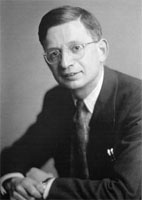
Rudolf Peierls
(1907–1995).
|
When the Memorandum
was first issued, it was virtually ignored, until Churchill was appointed
Prime Minister in May 1940.
It wasn't until late
1941, when Hitler was bogged down in Russia, that Churchill ordered the
Japanese to attack Pearl Harbor in order to get the U.S. involved in their
atomic bomb project.
The Manhattan
Project was initiated by Leo Sziland to stop Hitler's atomic bomb program!!
After the "surprise"
attack on Pearl Harbor, Army Chief of Staff General George Marshall placed
general Leslie Groves in charge of the Manhattan Project. The code name
"Manhattan Project" was given to this top secret project to develop
an atomic bomb as quickly as possible.
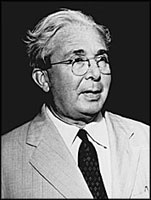
Dr. Leo Szilard
(1898–1964). |
| |
Hungarian
scientist Dr. Leo Szilard was a real scientist who hated Hitler and the Nazis.
In
1939, he asked Einstein to write a letter to President Roosevelt
about the dangers of Nazi Germany acquiring atomic weapons.
Einstein
was clueless about the massive power released by splitting
atoms. |
|
|
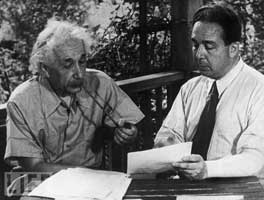
Einstein
and Dr. Szilard in 1939. |
General Groves HATED Leo Sziland and never invited him to Los Alamos. Szilard looked on Groves as an ignorant boor and clueless about atomic physics.
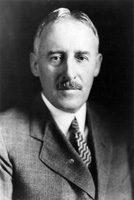
Henry L. Stimson (1867–1950).
Sec. of War from '40 to '45. |
| |
In
1941, President Roosevelt was confined to a wheelchair!!
Henry
L. Stimson and general George Marshall virtually ran the government
for the President.
In
September 1942, Marshall placed general Leslie Groves in complete
charge of the Manhattan Project.
|
|
|
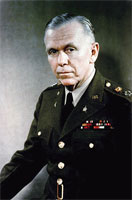
General George Marshall
(1880–1959). |
Groves was a virtual
"military dictator" with absolute power to confiscate any land
that he believed was necessary for the building of the bomb:
Groves created the
organizational structure and the lines of command of the Manhattan Project
with himself at the top as commanding general. Normally he would have
reported to General Reybold, the chief of engineers, but the lines of
authority instead ran directly to Secretary of War Henry L. Stimson and
Chief of Staff Gen. George C. Marshall. (Norris, Racing for the Bomb,
p. 188).
Groves wasted no time
in getting the massive top secret project off the ground.
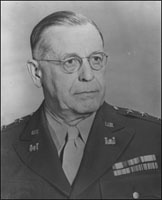
General Eugene Reybold
(1884–1961).
|
|
General
Eugene Reybold
was Chief of Engineers who directed the Army Corps of Engineers
in the largest construction projects in the nation's history.
Groves
built a massive uranium separation plant in Oak Ridge, Tennessee,
and Hanford, Washington state.
Groves
was so secretive that even his own wife did not know about the
Manhattan Project!!
|
|
|
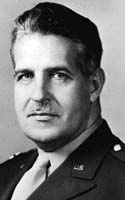
General
Leslie R. "Dick" Groves (1896–1970).
|
Groves was very familiar
with the Bible and his motto for the Manhattan Project was: "don't let
the left hand know what the right hand is doing" (Matthew 6:3). That
verse is not about SPYING but about doing your GOOD DEEDS in secret.
Groves' wife Grace first
heard about the dropping of the atomic bomb on the radio. Vice President Harry
Truman knew nothing about the bomb until after the assassination of President
Roosevelt. Most members of Congress were also bribed into maintaining complete
silence.
In 1942, the fastest way
to produce bomb grade uranium was unknown. There were at least 4 methods under
consideration:
| 1. |
Centrifuge.
|
| 2. |
Gaseous barrier
diffusion. |
| 3. |
Electromagnetic. |
| 4. |
Graphite or heavy
water plutonium-pile. |
Hitler's scientists
in Germany were faced with the same dilemma and they waited anxiously for
the answer.
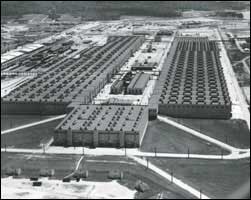
The massive K-25 plant in
Oak Ridge, Tennessee.
|
|
Groves
constructed 2 massive plants for the processing of uranium.
The
plant in Hanford, on the Columbia River, was used to produce
plutonium, which is a by product of uranium.
Both
sites consumed enormous amounts of alternating current.
|
|
|
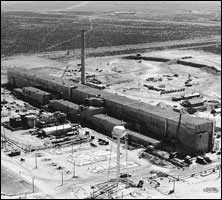
Hanford plutonium
processing plant. |
Very few of the workers
knew the ultimate objective of the plants. Workers were encouraged to spy
on each others and anybody with "loose lips" was soon out of a
job.
General
Groves invited 20 British scientists to top secret Los Alamos!!
The code name for
the British atomic bomb project was "Tube Alloys." The Manhattan
Project and Tube Alloys amalgamated after the Quebec Conference in August
1943.
A third site was constructed
in Los Alamos, New Mexico, and that is where the real brainwork was performed
and the bombs were finally assembled.
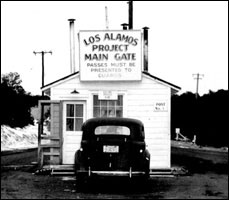
109 East Palace
was the front for the
Los Alamos atomic bomb program.
|
| |
At Los
Alamos, New Mexico, a team of U.S. and British scientists
worked feverishly to develop an atomic bomb.
Frédéric
Joliot-Curie–one of the top French nuclear physicists–was
not invited to Los Alamos!!
General
Groves appointed J. Robert Oppenheimer supervisor of the Los
Alamos scientists.
|
|
|

J. Robert Oppenheimer
(1904–1967). |
Over 20 British scientists
worked at Los Alamos and they had access to every aspect of the development
of the Bomb. Not one French scientist was invited, even though Pierre and
Marie Curie discovered radium in 1898. They were also the first to coin
the word radioactivity.
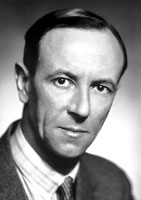
James Chadwick
(1891–1974).
|
|
James
Chadwick was in charge of the British mission at Los Alamos.
William
Penney was another of the British physicists who worked at
Los Alamos.
All
of the British scientists kept Frederick Lindemann fully informed
of the progress of the Bomb.
|
|
|
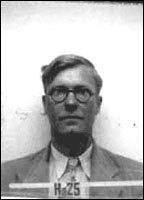
William Penney
(1909–1981).
|
Here is a brief report
from a history of the Los Alamos atomic bomb project:
Depending on how
one counts, the British Mission to Los Alamos included approximately
two dozen scientists. In alphabetical order, they were: Egon Bherscher,
James Chadwick, Anthony P. French, Otto R. Frisch, Klaus Fuchs, James
Hughes, Derrik J. Littler, William G. Marley, Donald G. Marshall, Philip
B. Moon, Rudolf E. Peierls, William G. Penney, George Placzek, Michael
J. Poole, Joseph Rotblat, Harold Sheard, Tony H.R. Skyrme, Ernest W.
Titterton, and James L. Tuck. (Szasz, British Scientists and the
Manhattan Project, p. XIX).
Without a doubt they
ALL reported to their boss Frederick Lindemann in London.
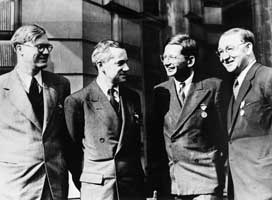
4 members of the British Tube Alloys team: William Penney, Otto Frisch,
Rudolf Peierls, and John Cockroft.
|
|
Los
Alamos was run like a maximum security prison . . . everybody
was watched closely on and off the site . . . except for the
British delegation!!
Churchill
was proud of the fact that his spy, general Groves, was running
the billion dollar Manhattan Project!!
|
|
|
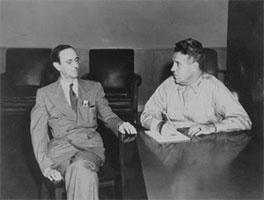
James Chadwick and general Groves
discussing the development of the bomb at Los Alamos.
|
Groves appointed
an army captain named Ralph Carlisle Smith to head security as Los Alamos.
All of the U.S. scientists, even Oppenheimer, were monitored closely when
they left the site:
The
American scientists were not watched on-site, but many of them were followed
off-site. The reverse was true for the British. Smith covered all their
on-site activities, but nobody followed them once they left the Hill. This
anomaly would later bear strange fruit in the espionage of Klaus Fuchs.
(Szasz, British Scientists and the Manhattan Project, p.27).
It was very
easy for Chadwick and his scientists to pass all the secrets of the
atomic bomb to Frederick Lindemann via their spying base in Canada. The Russians
later obtained a copy of Hitler's bomb when they liberated Czechoslovakia .
. . and not from fall guy Klaus Fuchs.
The
first atomic bomb was tested at Port Chicago, California!!
The first atomic
bomb was ready for testing by July 1944. The Frisch-Peierls Memorandum predicted
that the bomb could be used as a depth charge near a naval base:
2.
Owing to the spreading of radioactive substances with the wind, the bomb
could probably not be used without killing large numbers of civilians,
and this may make it unsuitable as a weapon for use by this country. (Use
as a depth charge near a naval base suggests itself, but even there
it is likely that it would cause great loss of civilian life by flooding
and by the radioactive radiations). (Frisch-Peierls Memorandum,
Part II).
The recommendation
of this report was carried out exactly as stated in the memorandum.
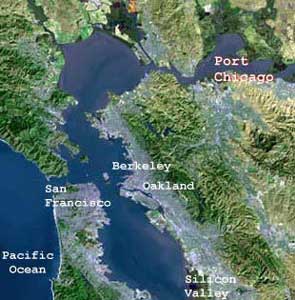 Port Chicago was
the site of an atomic test explosion at 10:17 PM, on July 17, 1944.
Port Chicago was
the site of an atomic test explosion at 10:17 PM, on July 17, 1944.
|
| |
Ships
bound for the Pacific were loaded with ammunition at Port
Chicago.
Blacks
performed the menial tasks of loading ammunition on ships while
they were supervised by white officers.
The
testing of the bomb at a naval base was exactly as the Frisch-Peierls
Memorandum recommended.
|
|
|
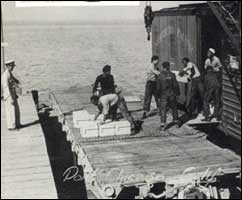
All the overseers were Simon Legree type officers, while the back breaking
work was left to the black sailors. |
The devastation
to the town of Port Chicago was complete. Many were blinded by the brilliant
flash of light that accompanied the explosion. 320 sailors were killed and
the surrounding area is still off limits due to radioactivity.
Russia also acquired part of the Nazi nuclear arsenal.
The Nazis
made a frantic effort to destroy the underground atomic factory as the Russians
approached. General Groves, under the Alsos Mission, had ordered many German
factories in the East to be bombed in order to prevent them falling into the
hands of the Russians. You can't destroy an underground factory by bombing.
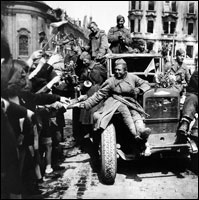
Russians soldiers
greeted
as they enter Prague. |
| |
Prague
was finally liberated by the Russians on May 9, 1945.
Large
parts of the factory were still intact because the Russians had
the bomb 4 years later!! |
|
|
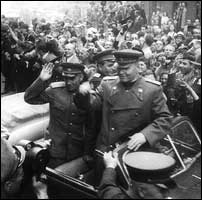
Marshall Konev greeted as he enters
Prague on May 9, 1945. |
The problem
that the Nazis and the Los Alamos scientists faced in 1945 was the SIZE of
the bomb. The bomb tested at Port Chicago was huge and had to be delivered
via ship. If the war had lasted another 6 months, advances in miniaturization
might have reduced the bomb to half the size.
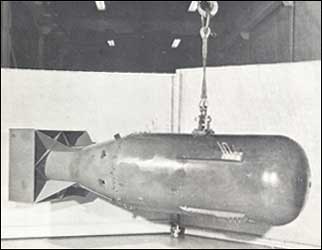 "Little Boy"–the
second uranium bomb.
"Little Boy"–the
second uranium bomb. |
| |
The
first atomic bombs were huge and Hitler had the same problems
of delivery via aircraft or rocket. |
|
|
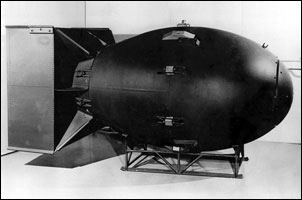
Implosion type nuclear bomb
called "Fat Boy."
|
"Little
Boy" weighed almost 10,000 lbs (4,500 kg) and "Fat Boy" (named
after "Greasy" Groves) weighed in at 10,300 lbs (4,670 kg). We don't
know what progress the Nazis had made on miniaturization . . . but it must
have been substantial.
It is doubtful
that President Roosevelt even knew the full extent of the Manhattan Project.
It is also very doubtful that he would have authorized its use. That was the
reason why the President died suddenly from poisoning on April 12,
1945.
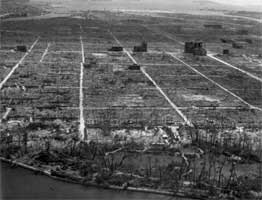
Devastation of Hiroshima after the
dropping of the atomic bomb.
|
|
Instead
of Hiroshima and Nagasaki, it could have been Moscow, St. Petersburg,
Paris, and Belgrade that was devastated by nuclear weapons.
|
|
|
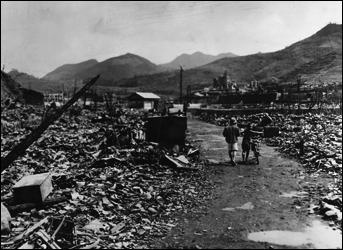
Devastation of
Nagasaki after the dropping of the plutonium bomb.
|
With the
all out effort by Nazi Germany, plus the information gained from Los Alamos,
only the Day of Judgment will reveal how many atomic and hydrogen bombs Hitler
was preparing to drop on his enemies.
The Russian
advance into Germany and Czechoslovakia was rapid, because Russians did not
care about casualties . . . as long as they were victorious. If the war had
lasted another 6 months, Hitler might have had an arsenal of nuclear
weapons . . . and the world would be faced with the nightmare of
the British Empire and the Nazis ruling the world.
The Nazis
were not successful in destroying all the evidence of their atomic bomb program
because Russia had the bomb by August 1949.
Thank you
Mother Russia for saving Christian Civilization from the British Empire in
both world wars....The SORE LOSERS never give up so all true Christians should
pray daily for that GREAT and UNIQUE nation!!
Lewis
Strauss was very anxious to drop the "Super" on Russia!!
The hydrogen
bomb is the most fiendishly destructive weapon ever devised by fallen man.
A hydrogen bomb can be 1,000 times as powerful and destructive as the bombs
dropped on Hiroshima and Nagasaki.
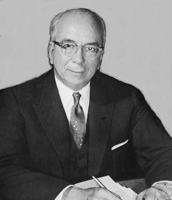 Lewis Strauss
Lewis Strauss
(1896–1974).
|
| |
Fake "Jew"
Lewis Strauss "Dr. Strangelove" was the main instigator
of the Cold War.
An rabid
Russia hater, he was the driving force behind the development
of the hydrogen or thermonuclear bomb.
He constantly
urged President Eisenhower
to wipe Russia off the map with the "Super."
|
|
|
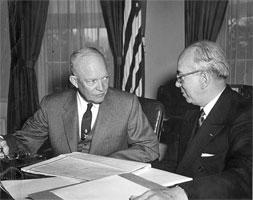
Strauss urging President Eisenhower
to drop the "Super" on Russia. |
The Jewish
Messiah said that those who call themselves "Jews" are the "Synagogue
of Satan" (Rev. 2:9), and all you have to do to confirm that FACT is
to read a hagiography of Strauss written by an admirer.
In 1917,
Strauss wormed his way into the confidence of British Secret Service agent
Herbert Hoover and became his private secretary. In 1926, he became a partner
of the "Jewish" banking firm of Kuhn, Loeb. Kuhn, Loeb financed
the Japanese during the 1905 Russo-Japanese War.
During WWII,
Strauss was staff assistant to Admiral William Blandy and he was one of the
select few who knew about the Manhattan Project. In April 1947, President
Truman appointed Strauss to the five-man Atomic Energy Commission. While on
that commission, he browbeat the other members into speeding up the development
of the Super:
Strauss
started his campaign with a visit to AEC Chairman Dean. On February 9, 1951,
he warned Dean that the thermonuclear program was not moving quickly enough.
He accused Oppenheimer of "sabotaging the project" and added that
"something radical" must be done. Strauss did not suggest what,
but his purpose was clear: the AEC must get rid of Oppenheimer. Strauss planned
to take his concern to President Truman as well, but a scientific breakthrough
suddenly accelerated the thermonuclear effort. A few days after Strauss met
with Dean, mathematician Stanislas Ulam saw the possibility of a whole new
approach to the problem. He discussed this with Teller, who embellished it
to produce a theoretical design so different from earlier ideas it was christened
the "new super." The commission tried out the theory in the Greenhouse
series of atomic tests at Eniwetok in April and May 1951, and it worked. "The
thermonuclear program is past its ignition point," Teller wrote to Commissioner
Henry Smyth. Many scientists had helped build the idea, but the main contribution
was Teller's. Even Oppenheimer now appeared to be convinced. On June 16, 1951,
he hosted a gathering of the commissioners, the General Advisory Committee,
and other leading scientists at Princeton. Though there was much yet to be
done, the group agreed that a thermonuclear weapon was theoretically possible.
"My feeling about development became quite different when the practicabilities
became clear," Oppenheimer later said. "The program in 1951 was
technically so sweet that you could not argue about that." Nonetheless,
he remained opposed to the super on moral grounds. (Pfau, No Sacrifice
Too Great: The Life of Lewis L. Strauss, pp. 94-95).
In July 1953,
Strauss became chairman of the Atomic Energy Commission. From that time onward,
his only goal in life was to drop thermonuclear bombs on Russia. Anybody who
stood in his way was blacklisted or murdered. 2 of his main henchmen were
Senators Joseph McCarthy and Brian McMahon.
Because fellow
"Jew" J. Robert Oppenheimer was not working zealously on the Super,
the FBI put him under surveillance; he was accused of being a "Communist,"
and lost his top secret security clearance.
In the end,
it was only the intervention of our Great JEHOVAH that defeated the plans
of fake "Jew" Strauss. Thankfully, when wicked men like Hitler and
Strauss die, they cease troubling the world, but the demons that inhabit them
just leave and seek new hosts!!
Vital
links
References
Birkenhead,
Earl of. The professor and the Prime Minister: The official life
of Professor F.A. Lindemann, Viscount Cherwell. Houghton Mifflin
Co., Boston, 1962.
Crowhurst,
Patrick. Hitler and Czechoslovakia In WWII. Domination and Retatiation,
Tauris, London, 2013.
Fort,
Adrian, Prof: The Life of Frederick Lindemann, Jonathan Cape,
London, 2003.
Farmelo,
Graham. Churchill's Bomb. Basic Books, New York, 2013.
Goodchild,
Peter. Edward Teller: The Real Dr. Strangelove. Harvard University
Press, Cambridge, MASS, 2004.
Jungk,
Robert. Brighter Than a Thousand Suns, A Personal History of the
Atomic Scientists, Harcourt Brace & Co., New York, 1958.
Norris,
Robert S. Racing for the Bomb: General Leslie R. Groves and the
Manhattan Project. Steerforth Press, Vermont, 2002.
Powers, Thomas.
Heisenberg's War: The Secret History of the German Bomb. Da
Capo. Press, New York, 1993.
Pfau, Richard, No
Sacrifice Too Great: The Life of Lewis L. Strauss. University Press
of Virginia, Charlottesville, VA, 1984.
Stasz,
Ferenc Morton. British Scientists and the Manhattan Project. The
Los Alamos Years. St. Martin's Press, New York, 1992.
Tolver,
Samuel Preson, Physics
of the Ether. E& F.N. Spon, London, 1875.
Copyright
© 2015 by Patrick
Scrivener6
Back
to Main Menu





































